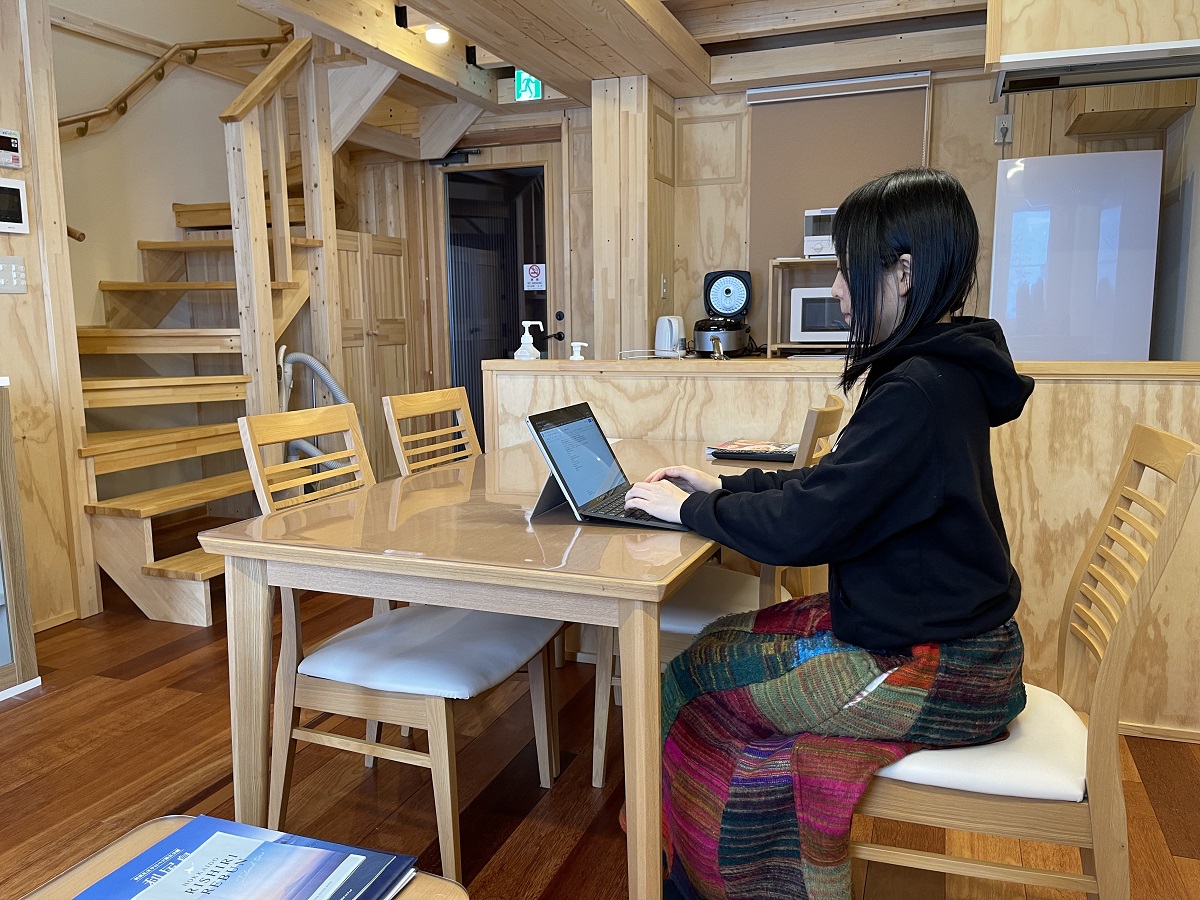Yukari Minai, who works for the venture company oVice. Her photo is from her workation in Otaru.
“When I did a workation in Yakushima, there was a dense sea of moss just a short distance from the telework place, and the way I was healed was different.
When I’m at home, I sometimes find myself working lazily even after dinner, but when I’m on Yakushima, it’s quiet in the evening, so it’s easy to find a balance naturally.Workation fever is accelerating now”
Workation is a combination of work and vacation.
Although it temporarily declined due to the declaration of a state of emergency due to the influence of the new coronavirus, interest in it has increased again as remote work has spread.
There is a couple who fully enjoy such remote work.
Yukari Yakubukuro (35), who works at oVice, which develops a virtual office business, spends about half of the year working across the country with her partner.
oVice raised a total of 4.5 billion yen on August 31stpublicationA company that continues to grow rapidly, such asBut also. What kind of life is it like working at such a startup?
Advertisements
The trigger was Fukuoka workation

A scene from Worsion in Kanazawa. Telework in the hotel coworking space.
Yakubukuro’s interest in workation dates back to about two years ago, when he was working for a major airline in his previous job.
Yakubukuro’s partner, Shuhei (a pseudonym) in his early 30s, and I went on a trip to Fukuoka together.
“On the calendar, it was a stepping-stone holiday, so I made the middle day of the weekday a working day instead of a paid holiday, and worked in the coworking space on the second floor of the hotel.
Originally, I was reluctant to work while traveling,When I tried it out, I was able to work normally, eat Fukuoka gourmet for lunch, and go sightseeing at night.I came to think so”
After that, Mr. Shuhei changed jobs to a start-up company in Kanto, where he works fully remotely. Mr. Yakubukuro also joined oVice after searching for a new job on the condition that he could work “fully remotely.”
“When I changed jobs, I wasn’t thinking about the kind of workation life I have now, but I think it would be nice to have a company where you can work from anywhere.
I also love my parents’ house in Yamanashi, and there are still many places I want to visit both in Japan and abroad.I have a strong desire to freely choose where to live.”
“Ladder Workation” from destination to destination
Yanbaru Kuina photographed by Mr. Yakubukuro during his workation in Okinawa. Early in the morning, he went out to look for Okinawa rails, and after that, he went to work online as usual in the morning.
Currently, the Yakubukuro couple are based in Kobe City, where Shuhei’s parents’ home is.
She rents a house owned by Shuhei’s relatives and lives in Kobe when she is not on business trips or working.
When I do a workation, I go to my accommodation on Friday night or Saturday, and on weekdays I go to work as usual at a co-working space, etc. from around 9 am to around 6 pm.
Recently, instead of returning home from the place of stay, people are heading straight from the place of stay to the place of stay.”Ladder Workation”sometimes
In June of this year, Yakubukuro moved directly from Kyoto to Rishiri Island in Hokkaido and practiced a workation for a total of two weeks. In July, she did a workation for about two weeks in line with her business trip to Naha, Okinawa.
In addition, in the past, in Hokkaido, I did workations in Sapporo, Kushiro, Furano, Lake Akan, Yamanashi, Nagano, Ishikawa, etc. while watching the infection status of Corona.
“Last year, when I went to Okinawa when the coronavirus was calm, I went to look for Yanbaru rail from 4am on weekdays, and went to work online at 9am.
My favorite workcation so far is Rishiri Island. Until then, I had no interest in living in a rural area, but I came to love the slow flow of time on the island.”
Utilize the subsidy system of local governments

In Kushiro, buy ingredients at the local market. “I enjoy going to local markets and supermarkets,” Yakubukuro said.

They often stay in condominiums with kitchens.
What worries me is the workcation cost.
In the case of Mr. and Mrs. Yakubukuro,The house in Kobe, which serves as a base, is rented from relatives, so the rent burden is small.Both of them lived in Tokyo during their previous job, but they said that they had doubts about paying high rent and living in Tokyo.
“In our case, the rent is also a big advantage,I think the cost of working is rather cheap when you consider the rent to live in Tokyo.
In our case, we often cook for ourselves at our accommodation. It’s fun to buy local ingredients at the supermarket and cook, and it’s cheaper than eating out.”
We are also using ways to keep accommodation costs low.
Some local governments, which are troubled by depopulation and depopulation, are taking the lead in providing low-priced workation plans and establishing subsidy systems. When Mr. Yakubukuro did a workation in Rishirifuji-cho on Rishiri Island, he used the “Workation/Trial Living Project,” which offers benefits such as being able to use accommodation facilities for 4,000 yen per night (in the case of a 2LDK).
It is said that not only local governments but also private lodging facilities are increasingly offering workation plans that allow guests to stay for several thousand yen per night.
Choice of accommodation is important

Working in a condominium on Rishiri Island.
Where you stay is also a point that determines the success or failure of a workcation.
“In my experience,Some plans put more emphasis on vacation than work, even though they are ready to workTherefore, we recommend that you check in advance.”
Recently, there are many cases where they introduce telework facilities with power supply and Wi-Fi,The working space can be used from the afternoon, and it closes immediately in the eveningIt is said that there is also a thing to do.
“Sometimes I couldn’t use the workspace anymore after checking out.After that experience, I became particularly thorough in my research, and I often read not only the information provided by local governments, but also SNS and blogs.
I think it is important to gather information based on the work environment.”
Advantages of “Couple Workcation”
The Jomon cedar I saw while trekking on Yakushima on my day off.
It sounds like a workation life full of good things, butMr. Yakubukuro, who works at the rapidly growing venture company oVice, has a busy life.is.
In addition to coordinating media interviews as a public relations officer, I also issue a press release about the service “once every two days” in busy months. He also created presentation materials for the president and was in charge of supporting companies that introduced oVice.
At the time of funding announced at the end of August, we also announced a press release for the United States. Since the local announcement was at 10 p.m. Japan time,Yakubukuro said he had to follow up in the middle of the night.
“Honestly, there is always a lot of work to be done. Currently, we have more than 100 employees, including foreign nationals living overseas.Assuming that there is a venture, it feels like everyone is in charge of various tasks beyond their responsibilities.”
Even in such a busy situation, I can continue my workation life”We support each other when we’re busy.”Yakubukuro says.

At Lake Akan, he was able to capture “frost flowers,” in which frost forms like flowers on the surface of the lake.
“Basically, we divide up the housework, but with workcations, we often work closer together, so it’s easier to follow up.
When you’re busy, you can cook meals for them or do the laundry for them, so you can both concentrate on your work.It may be a good thing unique to couple work”
For Shuhei, on the other hand, the workation life is fulfilling.
“I think the good thing about working as a couple is that you can broaden your experience. I tend to choose a city as a workation destination, but my partner chooses a land rich in nature that I wouldn’t choose, so it’s refreshing.
In my case, I work from 9:00 to 18:00 no matter where I am, so my work efficiency doesn’t change at all whether I’m at home or working.I think he’s the type that’s suitable for workations.” (Mr. Shuhei)
Mr. and Mrs. Yakubukuro are also planning their first overseas workation for a week in Canada next year.
“I think it would be interesting to be able to telework while waiting for the aurora.”
(Text by Kotaro Yokoyama)
Source: BusinessInsider
David Ortiz is an opinionated and well-versed author, known for his thought-provoking and persuasive writing on various matters. He currently works as a writer at 24 news breaker, where he shares his insight and perspective on today’s most pressing issues. David’s unique voice and writing style make his articles a must-read for those seeking a different point of view.


